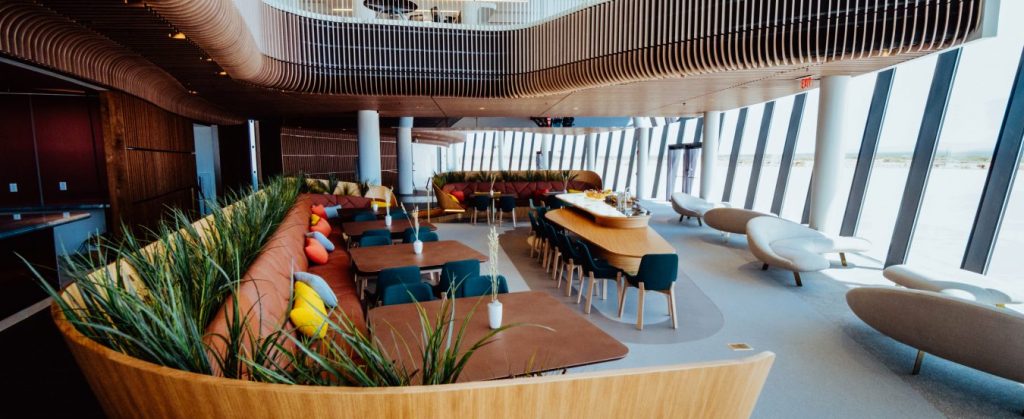With the future looking progressively more dystopian as a result of the toxic impact of climate change; simmering socio-political rivalry and widespread consternation regarding the national security of assets – commercialised space travel seems to add a more positive dimension to this sci-fi narrative.

A previously unthought of, almost fantastical concept has now become a reality as Sir Richard Branson’s Virgin Galactic pledges to commercialise flights going into space. Following severe scepticism and doubt regarding the technical capacity of such an industry – the company managed to mitigate this public reaction by successfully launching the first suborbital space flight on 13th December 2018. Virgin Galactic continues to corroborate their vision as they expand their fleet of VSS Unity spacecrafts and has even established the world’s first commercial spaceport.



The space odyssey has been remarketed as a leisurely activity that aims to reinforce “planetary unity” and broaden the horizons of those utilising the services, as opposed to being a predominantly scientific venture.
Allegedly the service will be available from 2020 and will cater to regular individuals with no scientific qualifications or background albeit they will need to undergo some physical training.
Despite the initial cost being an astronomical $250,000 per seat, Richard Branson envisions that this will be reduced to $50,000 in the next decade. The commercial promise of the industry has prompted other visionary entrepreneurs to emulate Branson’s approach. SpaceX and Blue Origin are subsequent space tourism start-ups initiated by Elon Musk and Jeff Bezos.
As the industry continues to gain traction however, many people also grow increasingly concerned.
Safety and Technical Doubts
When one thinks about space tourism, the idea doesn’t immediately register as pragmatic. A definite dubiety regarding the science and technology behind such a venture has precluded many industrialists in the past from even attempting to push the notion forward – despite the existence of commercial potential.
One may argue that the overt risks of participants not following their pre-flight fitness regimes may compromise health and stamina of tourists when they leave the Earth’s atmosphere. What is more, a lack of professional scientific training may also result in participants contracting lunar diseases or allergies – a similar scenario to what happened to Caribbean tribes who lost 90% of their population as a result of new diseases emerging from when European settlers came to explore the region.
However, quite possibly the most serious of risks includes the actual method of exploration and how reliable intergalactic apparatus is; more simply, will the VSS Unity Spacecraft actually work?
Despite several tests, humans are historically renowned to view all supposedly ‘impossible’ feats with incredulity and mistrust. After the death of various daredevil pilots such as Leon Delegrange in the 1900s, similar doubts arose regarding the future of aviation.
Aviation in our current day and age is an industry like any other; the stigma that momentarily surrounded the industry at the time is now almost non-existent. Emerging technological cynicism regarding space tourism may therefore also be a futile point of contention when evaluating the cons of this new industry.
The Climate
Another concern for many, is the impact that commercialised space travel will have on the environment once it becomes mainstream.
The main environmental issue here stems from how spacecrafts gain their initial momentum – this happens through burning rocket fuel. Unlike in a car engine, rocket fuel is burned directly and is needed in bulk to last the duration of a mission. This means that 95% of the rocket’s mass is actually fuel – resulting in a plethora of bi-products including Water Vapour, Carbon Dioxide, soot particles and Alumina.
Although the effects of Water Vapour won’t compound the greenhouse effect and is infinitesimal in comparison to other sources of green-house gases, the same cannot be said for Carbon Dioxide, soot particles and Alumina. Unlike in the Troposphere, when soot particles and Alumina accumulate in the Stratosphere, they cannot be washed away and dissolved by the rain. Instead they absorb energy from the sun and in turn neutralise the effects of global warming by producing a cooling effect that reduces the heat radiating off the Earth’s surface.
It should be noted though, that the Ozone layer is thought to bear the brunt of this partially positive development resulting in an increase in harmful radiation from the sun – consequently causing a spike in conditions such as skin Cancer.
The question then remains, can we bring life to another planet at the expense of debilitating the health of our own? Is this a feasible notion considering we have no planetary alternative to Earth? Conversely, intergalactic exploration may also help countervail the threat of our deteriorating planet by gradually introducing regular humans to new environments and resources, that can be utilised to prolong sustainability on Earth. Climate uncertainty therefore underpins the dispute revolving around whether Elon Musk’s pledge to send 1 million people to Mars by 2060 is a sustainable promise.
Contradiction and Inequality
The last of this three-fold package of concerns, is whether this new service will impact quality of life on Earth. As mentioned previously, the starting price of the service is extortionate and unaffordable for the masses.
Even if over the years the value of space tourism decreases and it becomes an increasingly regular commodity, just what percentage of the population will be able to participate in this interstellar experience? It almost seems as though space tourism will eventually become another business endeavour that will inevitably deepen and further entrench socio-economic inequality; somewhat contradicting the planetary unity and perspective it aims to promote. Notwithstanding this possible fate, the industry could also perhaps create a plethora of new jobs and provide more opportunities in the market for people to gain a foothold in an increasingly profitable enterprise.
All this being said, it is unclear what the general consensus regarding space tourism is and how it will affect individuals on a domestic level. What is clear is the revolutionary impact that the success of this project will have on generations to come.


